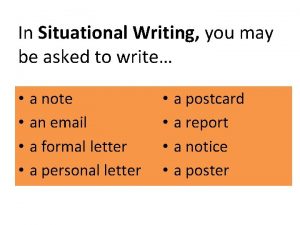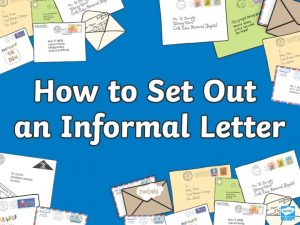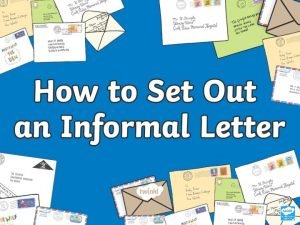Writing an informal letter 1 2 3 Planning





- Slides: 5

Writing an informal letter

1. 2. 3. Planning - Always spend a few minutes planning what you will say and to whom – get your audience right! Ordering - Organise the order in which you present and structure your ideas Layout (on slide below) - Ensure you use the correct layout for an informal letter 4. Start using the standard layout and include a lively start • apologies for not writing sooner but I have been swamped by homework… • a little bird tells me you’re thinking of running the London marathon for charity. . 5. Write up the ideas from your plan, creating a detailed paragraph for each one with convincing and realistic comments. • Keep tone informal and lively but avoid slang, and text language. (REMEMBER – You have to show off your wonderful writing skills even if it is informal letter writing) • Write in paragraphs – one for each idea 6. Write a final paragraph that could perhaps refer to a future meeting/action etc • See you at Sam’s barbecue – be sure to bring the chocolate cake! SIGN off with your name and DO NOT USE yours faithfully/sincerely See you soon, Tom 7. Proofreading - Spend a few minutes reading and checking through your letter. Remember the literacy targets you have been given in English.

1 Green Lane Euxton Chorley Lancashire PR 7 9 NH 7 th July, 2014 Hi Sam Friendly Introduction to reason for letter Two or three paragraphs discussing different areas of interest that may also be related to the main reason for writing. Informal letters often use ‘I’ or me BUT NO SLANG. Conclusion – summarising/signing off and suggesting future correspondence/meeting up/action Love/From/Take care/Best wishes/See you soon

A FOREST DRIP You can still use some of these techniques • Anecdotes – remember the lady from London who swallowed a fly and everyone thought she would die? • Facts/statistics – over 96% of the people at school said. . • Opinions – the best way to lose weight is to cut out fatty foods • Rhetorical question – don’t we all want to go on holiday? • Emotive language/exaggeration – the tragic loss of pies from the school lunch menu…. • Sarcasm or humour – you do know that training for a marathon does not include a daily jog to Macdonald’s? • Triples – annoyed, appalled and irritated • Direct language/inclusive language – you, we, our, us • Repetition – education, education • Imperatives – try this, consider…picture, imagine, follow, look, stop, • Punctuation for effect - ! ? : ; -

Example Dear Tom How are you doing? My sincere apologies for not writing sooner! As you know, Freya is getting married so I have been frantically helping her with all the wedding preparations. Dear Sarah, Fantastic news about your GSCEs – great grades. And how is it going with the ‘new romance’ (nod, wink, wink)? Anyway, I must extend my apologies for not writing sooner; I have been working ‘day and night’ to try and raise the air fare to go with Libby to Paris. Thankfully, only two hundred pounds to go then ‘Vive la France’!









